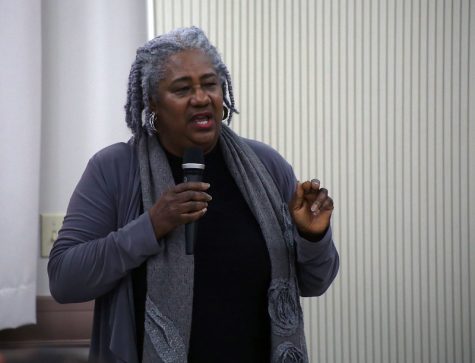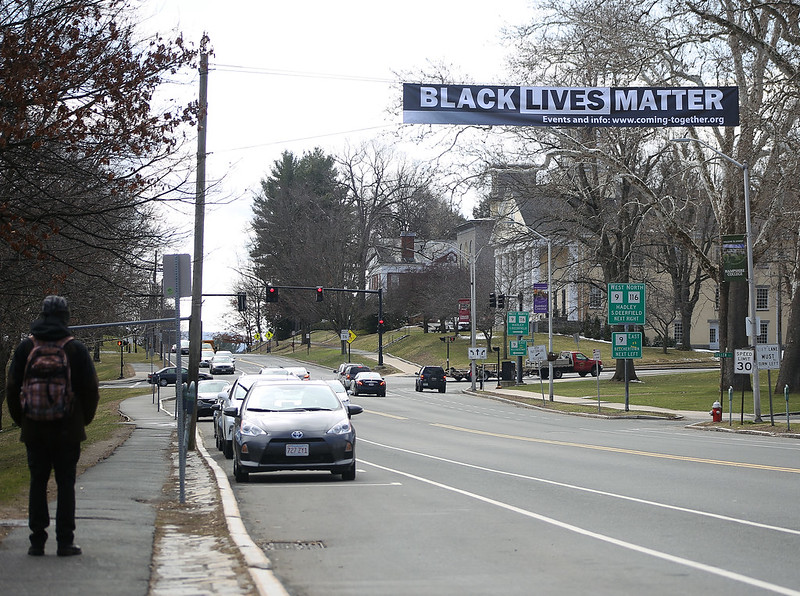On Wednesday night, University of Massachusetts professor emeritus Dr. Barbara Love gave a presentation to members of the UMass community that addressed issues ranging from climate change to Tulsa’s history, and the link between the two.
Love is a professor emeritus of social justice education at the UMass College of Education. She works with community-based organizations around the world to provide training on peer counseling healing groups. Her website specifies that her work on community healing addresses “genocide, internalized genocide, war, dislocation, racism, internalized racism, and trauma from social-identity based oppression.”
The talk started out with an introduction from Assistant Vice Chancellor for Advocacy, Inclusion and Support Programs Shelly Perdomo, the mediator for the night.
In an email sent out to those who registered, the organizers of the event wrote, “to help this event hold both our courage and our fears, we are using a format that is as brave and as safe as we can make it.” This format included a moderator, closed captioning for the event, disabled screen sharing, a group chat on Zoom, and the intention to later post a recording of the event.
Vice Chancellor for Student Affairs and Campus Life Dr. Brandi Hephner LaBanc, shared a few words at the beginning of the event as well, emphasizing that “this work will continue through the summer.”
“Dr. Love was the only person that I knew that could hold this incredibly difficult and challenging space,” Perdomo said in her opening statement. “I can’t speak for the students, I can only speak for myself, but I have been sitting in a place of moving from emotions from anger to range, and simultaneously energized by the incredible leadership and activism that I’m seeing with the youth that are out there.”

In the course of the hour-long talk, Love touched on a variety of issues – both contemporary and historical – pertaining to the ongoing protests around the country against police brutality and racism. For the second half-hour she took a few questions submitted in the Q&A section of the Zoom call.
Love discussed topics including trauma, allyship and informed awareness, and told the audience to “find the way to take care of your mental health” and to not “assume that you can go through this trauma untouched.”
“I am absolutely delighted to have the opportunity to share this space with you,” Love said, as she began her talk. “These are indeed troubling times, and the trauma that we are all facing during these times is extraordinary. For many people it is the same, and in certain ways it is very different. And it’s so important that we have this opportunity to come together, to think together, to share our voices, to share our ideas together.”
Love discussed the historical significance of this time, linking the “exposure of racism in a particularly gruesome form” to climate change and the “global killer pandemic.” These three “potentially catastrophic events” create the bigger context within which she “wants us to sit still and reflect and contemplate and try to breathe through.” She emphasized the need to “consider each of these three catastrophic possibilities in conjunction with each other.”
“We at this moment in our history get to recognize that there’s a problem with that kind of disconnect, and we get this historical moment to bring that to the forefront and fix it. Because the raw racism we have been witnessing is not new, it is not different, it is not something that just recently started to happen,” Love explained. “And these three things are not disconnected. Climate change is affecting frontline communities that are primarily Black and Brown. Nations that are primarily Black and Brown. And it is not something that is going to affect them in the future, it is something that is affecting them already.”
Love also gave advice for people looking to make a change, including people looking to be allies, telling the audience to “let your voice put out the vision you want.” She called for allies to take action not on behalf of other people, but because they are personally offended by the racism.
Through the course of the talk, Love also elaborated on her personal experiences, calling herself “a child of the ‘60s,” and described speaking with people in Tulsa whose family members remembered seeing their white neighbors wearing their clothes or displaying their furniture, after Tulsa was bombed and looted in the Tulsa Race Massacre.
“Going forward we’ll have to do the things that are required to support our health, while figuring out how to reclaim our connections, to broaden and strengthen our connections. We’ll have to remember that all of these feelings that we have are just fine, no matter what they are,” advised Love. “Because feelings are just feelings, and there’s one thing only to do with feelings, and that is to feel them. … Then recognize that we have to let them go. They are not the basis on which to make any decisions.”
In the transition from her talk to the Q&A, Love concluded her remarks with a parallel example involving the Hubble Space Telescope. In a recent story, a scientist had the idea to point the telescope toward a dark spot in the sky, and the result was finding thousands of galaxies where previously scientists had thought it wasn’t worth looking.
“That’s the thought I want to leave with you. Outside the distortions created by oppression, there is a world that works well for everyone, and we haven’t seen it yet, because we haven’t been able to create it,” she said. “But that does not mean it does not exist, that it cannot exist, that we cannot usher such a world into existence.”
At the end of the talk, Love answered a question about whether she thinks if the number of white activists participating in these protest make them different from past ones. She answered by discussing the rhetoric of post-racial society by white people after President Obama’s election, and talking about the importance that “more people recognize that action is required of them.”
“You’ve got to have informed awareness, and following awareness of the situation, you have to decide what to do,” Love told her audience as part of her concluding remarks. “You have to decide what actions you can take in any given situation, what actions work for you in your conscious … and then do it. Decide … and then how do we support each other? How do we hold each other accountable? Accountability is an interesting concept, because I can’t take responsibility for you, you can’t take responsibility for me, but we can support each other to hold our intention in a way that is consistent with our vision. … To hold our intention and behavior in a way that is consistent with the world that we want.”
The recording of the talk will be made available online, and is the beginning of a series of conversations, dialogues and programs that will be coming out this summer and fall semester, according to Perdomo.
Claire Healy is an Assistant News Editor and can be reached at [email protected] and followed on Twitter @clurhealy.



















